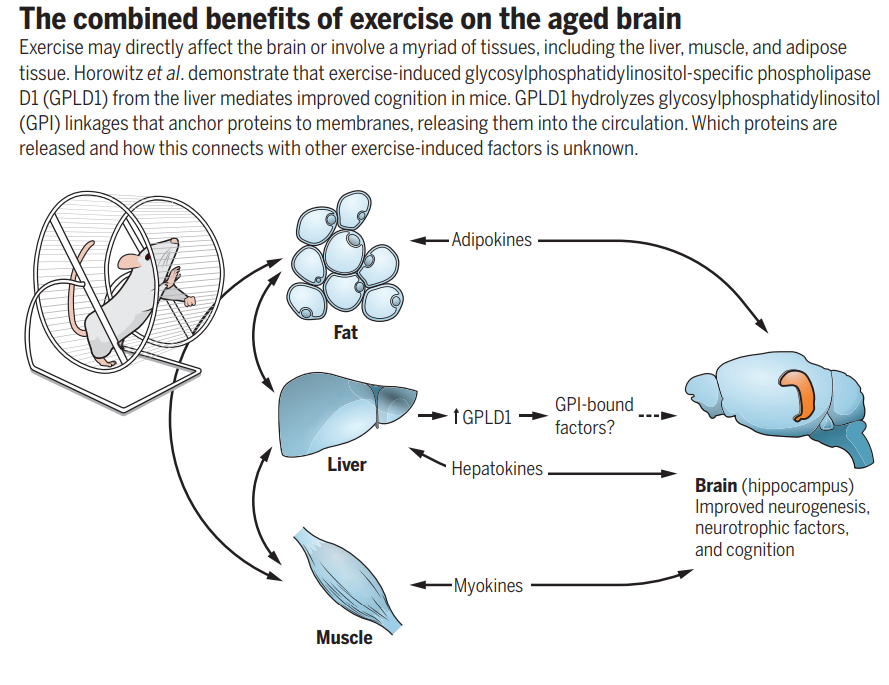Exercise is one of the best-studied and most powerful ways of protecting the brain from age-related cognitive decline and has been shown to improve cognition in individuals at risk of neurodegenerative disease such as Alzheimer's disease and frontotemporal dementia—even those with rare gene variants that inevitably lead to dementia.
But many older adults are not able to exercise regularly due to physical limitations or disabilities, and researchers have long searched for therapies that could confer some of the same neurological benefits in people with low physical activity levels.
The new study, published July 9, 2020 in Science, showed that after mice exercise, their livers secrete a protein called Gpld1 into the blood. Levels of this protein in the blood correspond to improved cognitive function in aged mice, and a collaboration with the UCSF Memory and Aging Center found that the enzyme is also elevated in the blood of elderly humans who exercise regularly. But the researchers showed that simply increasing the amount of Gpld1 produced by the mouse liver could confer many of the same brain benefits as regular exercise.
Villeda's lab has previously shown that biological factors present in the blood of young mice can rejuvenate the aging mouse brain, and conversely, factors in the blood of older mice can bring on premature age-related cognitive decline in young mice.
The team found that Gpld1 increases in the blood circulation of mice following exercise, and that Gpld1 levels correlate closely with improvements in the animals' cognitive performance. Analysis of human data collected as part of the UCSF Memory and Aging Center's Hillblom Aging Network study showed that Gpld1 is also elevated in the blood of healthy, active elderly adults compared to less active elders.
"Through this protein, the liver is responding to physical activity and telling the old brain to get young," Villeda added. "This is a remarkable example of liver-to-brain communication that, to the best of our knowledge, no one knew existed.
Further laboratory experiments have shown that Gpld1 produced by the liver does not pass through the so-called blood-brain barrier, which protects the brain from toxic or infectious agents in the blood. Instead, the protein appears to exert its effects on the brain via pathways that reduce inflammation and blood coagulation throughout the body. Both blood coagulation and inflammation are known to be elevated with age and have been linked to dementia and age-related cognitive decline.

reference
A.M. Horowitz el al., "Blood factors transfer benefits of exercise on neurogenesis and cognition to the aged brain," Science (2020). science.sciencemag.org/cgi/doi … 1126/science.aaw2622
V.A. Ansere el al., "Exercising your mind," Science (2020). science.sciencemag.org/cgi/doi … 1126/science.abc8830
'support Ryu' 카테고리의 다른 글
| 먹는 것과 머리카락의 관계 (0) | 2020.08.04 |
|---|---|
| 장수와 철분의 관계 (0) | 2020.07.17 |
| 항산화제와 치매 (0) | 2020.07.01 |
| 과식과 면역반응. (0) | 2020.07.01 |
| 스트레스와 brown fat의 관계... (0) | 2020.07.01 |
